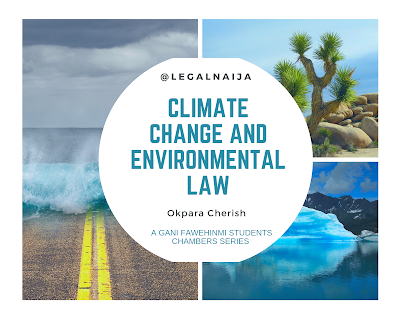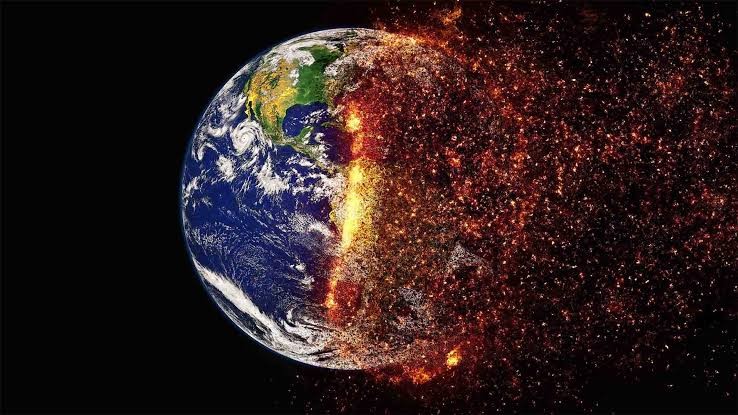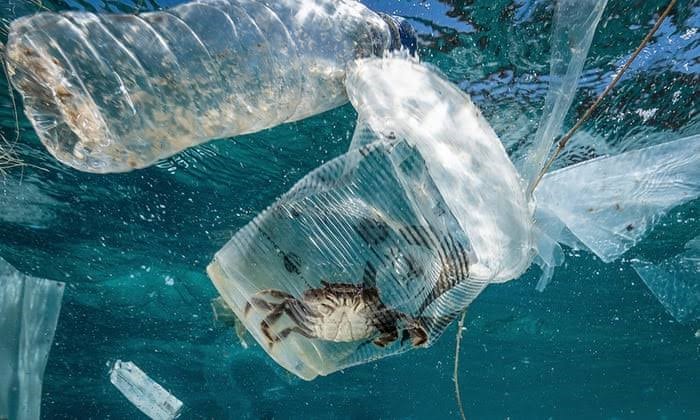
“We
are running the most dangerous
are running the most dangerous
experiment
in history right now,
in history right now,
which
is to find out how much carbon dioxide
is to find out how much carbon dioxide
the atmosphere can handle before
there
is an environmental catastrophe.”(ELON MUSK)
is an environmental catastrophe.”(ELON MUSK)
Climate change is a change in global or
regional climate patterns, in particular a change apparent from the mid to late
20th century onwards and attributed largely to the increased levels of
atmospheric carbon dioxide produced by the use of fossil fuels. Climate change
occurs when changes in Earth’s climate system result in new weather patterns
that last for at least a few decades, and maybe for millions of years. The
climate system comprises five interacting parts, the atmosphere, hydrosphere,
cryosphere, biosphere, and lithosphere(Wikipedia).
regional climate patterns, in particular a change apparent from the mid to late
20th century onwards and attributed largely to the increased levels of
atmospheric carbon dioxide produced by the use of fossil fuels. Climate change
occurs when changes in Earth’s climate system result in new weather patterns
that last for at least a few decades, and maybe for millions of years. The
climate system comprises five interacting parts, the atmosphere, hydrosphere,
cryosphere, biosphere, and lithosphere(Wikipedia).

Climate change has become one of the greatest
global challenges of our times. Climate change affects people all over the
world. Effects that scientists had predicted in the past would result from
global climate change are now occurring, such as loss of sea ice, accelerated
sea level rise and longer, more intense heat waves. Science shows that as time
goes by, it will get extremely worse. Worse impacts will be on the lives and
livelihoods of the poor and developing countries, especially small island
states. We are increasingly aware that what happens in one part of the globe
can affect another part of the globe – be it toxic pollutants from Asia, Europe
and North America contaminating the Arctic or the greenhouse gases of the
industrialised regions triggering droughts or the melting of glaciers in the
less industrialised ones.
global challenges of our times. Climate change affects people all over the
world. Effects that scientists had predicted in the past would result from
global climate change are now occurring, such as loss of sea ice, accelerated
sea level rise and longer, more intense heat waves. Science shows that as time
goes by, it will get extremely worse. Worse impacts will be on the lives and
livelihoods of the poor and developing countries, especially small island
states. We are increasingly aware that what happens in one part of the globe
can affect another part of the globe – be it toxic pollutants from Asia, Europe
and North America contaminating the Arctic or the greenhouse gases of the
industrialised regions triggering droughts or the melting of glaciers in the
less industrialised ones.
According
to the IPCC (Intergovernmental Panel on Climate Change), human-caused global
warming is driving climate changes impacting both human and natural systems on
all continents and across the oceans. Human-caused global warming results from
the increased use of fossil fuels in transportation, manufacturing and
communications.
to the IPCC (Intergovernmental Panel on Climate Change), human-caused global
warming is driving climate changes impacting both human and natural systems on
all continents and across the oceans. Human-caused global warming results from
the increased use of fossil fuels in transportation, manufacturing and
communications.
The
Intergovernmental Panel on Climate Change is an intergovernmental body of the
United Nations, dedicated to providing the world with an objective, scientific
view of climate change, its natural, political and economic impacts and risks,
and possible response options.
Intergovernmental Panel on Climate Change is an intergovernmental body of the
United Nations, dedicated to providing the world with an objective, scientific
view of climate change, its natural, political and economic impacts and risks,
and possible response options.
In
Nigeria, according to findings from EcowarriorsNG (A Non Governmental Organization)
during their Climate Change Awareness Walk at Magodo; there is very little
sensitization on climate change and global warming. The very few that know just
hear of it in movies and do not educate their minds further.
Nigeria, according to findings from EcowarriorsNG (A Non Governmental Organization)
during their Climate Change Awareness Walk at Magodo; there is very little
sensitization on climate change and global warming. The very few that know just
hear of it in movies and do not educate their minds further.

According
to a survey done by the World Health Organisation, Onitsha is rated as the
dirtiest city in Nigeria. Aba is a popular city in Nigeria known for its
commercial activities. Also, the Association of Waste Managers of Nigeria,
popularly known as Public Private Participation, says Lagos State has now
become one of the dirtiest cities in the world.
to a survey done by the World Health Organisation, Onitsha is rated as the
dirtiest city in Nigeria. Aba is a popular city in Nigeria known for its
commercial activities. Also, the Association of Waste Managers of Nigeria,
popularly known as Public Private Participation, says Lagos State has now
become one of the dirtiest cities in the world.
Most
of this waste gets into the drainage system, blocks them leaving waters to
flood the roads and into the ocean.Plastics pollution has a direct and deadly
effect on wildlife. Thousands of seabirds and sea turtles, seals and other
marine mammals are killed each year after ingesting plastic or getting
entangled in it.
of this waste gets into the drainage system, blocks them leaving waters to
flood the roads and into the ocean.Plastics pollution has a direct and deadly
effect on wildlife. Thousands of seabirds and sea turtles, seals and other
marine mammals are killed each year after ingesting plastic or getting
entangled in it.
The
2014 World Climate Change Vulnerability Index classified Nigeria as one of the
10 most climate-vulnerable countries, and Lagos as the 10th most vulnerable
city in the world. The continued heavy reliance on fossil fuel-powered
generators in Nigeria by government institutions, businesses and households for
electricity supply constitutes a major threat to the nation’s climate change
plans. The dark smoky fumes that comes out of the exhaust of some commercial buses
in Lagos is enough to keep the country in total darkness.
2014 World Climate Change Vulnerability Index classified Nigeria as one of the
10 most climate-vulnerable countries, and Lagos as the 10th most vulnerable
city in the world. The continued heavy reliance on fossil fuel-powered
generators in Nigeria by government institutions, businesses and households for
electricity supply constitutes a major threat to the nation’s climate change
plans. The dark smoky fumes that comes out of the exhaust of some commercial buses
in Lagos is enough to keep the country in total darkness.
As of 2005, Nigeria has the highest rate of
deforestation in the world according to the Food and Agriculture Organization
of the ited Nations (FAO). Between 2000 and 2005 the country lost 55.7% of its
primary forests, and the rate of forest change increased by 31.2% to 3.12% per
annum. Forest has been cleared for logging, timber export, subsistence
agriculture and notably the collection of wood for fuel which remains
problematic in western Africa.
deforestation in the world according to the Food and Agriculture Organization
of the ited Nations (FAO). Between 2000 and 2005 the country lost 55.7% of its
primary forests, and the rate of forest change increased by 31.2% to 3.12% per
annum. Forest has been cleared for logging, timber export, subsistence
agriculture and notably the collection of wood for fuel which remains
problematic in western Africa.
In
2005 12.2%, the equivalent of 11,089,000 hectares (27,400,000 acres) had been
forested in Nigeria. Between 1990 and 2000, Nigeria lost an average of 409,700
hectares of forest every year equal to an average annual deforestation rate of
2.38%. Between 1990 and 2005, in total Nigeria lost 35.7% of its forest cover,
or around 6,145,000 hectares.
2005 12.2%, the equivalent of 11,089,000 hectares (27,400,000 acres) had been
forested in Nigeria. Between 1990 and 2000, Nigeria lost an average of 409,700
hectares of forest every year equal to an average annual deforestation rate of
2.38%. Between 1990 and 2005, in total Nigeria lost 35.7% of its forest cover,
or around 6,145,000 hectares.
In 2015, the Nigerian Federal Executive
Council (FEC) approved the adoption of National Policy on Climate Change and
Response Strategy (NPCC-RS), as a National Document for implementing climate
activities in the country. The National Environmental Standards and Regulations
Enforcement Agency NESREA, is the major federal body responsible for protecting
Nigeria’s environment is responsible for enforcing all environmental laws,
regulations, guidelines, and standards ‘[National Environmental Standards
Regulations and Enforcement Agency (Establishment) Act 2007 (NESREAA) and the
33 Regulations made by the Minister of Environment under section 34 of the Act
This statute was created under the 1999 Constitution of the Federal Republic of
Nigeria (section 20) and repealed the Federal Environmental Protection Act 1988].These
laws prohibit the carrying, depositing and dumping of harmful waste on land and
in territorial waters among other things.
Council (FEC) approved the adoption of National Policy on Climate Change and
Response Strategy (NPCC-RS), as a National Document for implementing climate
activities in the country. The National Environmental Standards and Regulations
Enforcement Agency NESREA, is the major federal body responsible for protecting
Nigeria’s environment is responsible for enforcing all environmental laws,
regulations, guidelines, and standards ‘[National Environmental Standards
Regulations and Enforcement Agency (Establishment) Act 2007 (NESREAA) and the
33 Regulations made by the Minister of Environment under section 34 of the Act
This statute was created under the 1999 Constitution of the Federal Republic of
Nigeria (section 20) and repealed the Federal Environmental Protection Act 1988].These
laws prohibit the carrying, depositing and dumping of harmful waste on land and
in territorial waters among other things.
Despite
the regulations we seemingly have in place, there is has been no major
milestone in combating climate change and global warming in Nigeria.
the regulations we seemingly have in place, there is has been no major
milestone in combating climate change and global warming in Nigeria.
In
an article written by YUSUF OLAOLU on Legal Professions and Climate
Change in Nigeria; he stated
that:
an article written by YUSUF OLAOLU on Legal Professions and Climate
Change in Nigeria; he stated
that:

“Climate
Change, Energy and Sustainability are rapidly developing areas of law. There
has been significant activity at the national and international levels to
design and implement specific legal tools to address climate change and
renewable energy concerns. The coming years will see increased attention to a
broad range of climate and renewable energy issues at all levels of government.
Almost all business sectors and industries will be affected, including public
entities, non-profit institutions, lenders, developers, investors, landowners,
and companies in the engineering and construction, chemical, industrial and
manufacturing, transportation, and waste management sectors.
Change, Energy and Sustainability are rapidly developing areas of law. There
has been significant activity at the national and international levels to
design and implement specific legal tools to address climate change and
renewable energy concerns. The coming years will see increased attention to a
broad range of climate and renewable energy issues at all levels of government.
Almost all business sectors and industries will be affected, including public
entities, non-profit institutions, lenders, developers, investors, landowners,
and companies in the engineering and construction, chemical, industrial and
manufacturing, transportation, and waste management sectors.
It
is time the legal profession turns its attention to the global dimensions of
this serious challenge and motivate decision-makers to bring about a
transformation of institutions and agreements to protect the lives of those who
would be worst affected by the impact of climate change. There are a number of
opportunities that exist for lawyers from the emergent regulatory and corporate
responses to climate change. Most importantly, the emerging Climate Change Bill
(the significant local legislation on Climate Change) in Nigeria and
International Treaties will generate new business opportunities and additional
regulatory risks. It is imperative for lawyers to be able to recognize and analyze
them for developmental gains. “
is time the legal profession turns its attention to the global dimensions of
this serious challenge and motivate decision-makers to bring about a
transformation of institutions and agreements to protect the lives of those who
would be worst affected by the impact of climate change. There are a number of
opportunities that exist for lawyers from the emergent regulatory and corporate
responses to climate change. Most importantly, the emerging Climate Change Bill
(the significant local legislation on Climate Change) in Nigeria and
International Treaties will generate new business opportunities and additional
regulatory risks. It is imperative for lawyers to be able to recognize and analyze
them for developmental gains. “
There
is a scarcity of legislation dealing with climate change. Nigerians disregard topics
related to climate change and global warming. These changes have led to the
emergence of large-scale environmental hazards to human health, such as extreme
weather, ozone depletion, increased danger of wildland fires, loss of
biodiversity, stresses to food-producing systems and the global spread of
infectious diseases. In addition, climatic changes are estimated to cause over
150,000 deaths annually.
is a scarcity of legislation dealing with climate change. Nigerians disregard topics
related to climate change and global warming. These changes have led to the
emergence of large-scale environmental hazards to human health, such as extreme
weather, ozone depletion, increased danger of wildland fires, loss of
biodiversity, stresses to food-producing systems and the global spread of
infectious diseases. In addition, climatic changes are estimated to cause over
150,000 deaths annually.
“TWENTY
FIVE YEARS AGO PEOPLE COULD HAVE BEEN EXCUSED FOR NOT KNOWING MUCH, OR DOING
MUCH ABOUT CLIMATE CHANGE. NOW YOU HAVE NO EXCUSE!!” (Desmond Tutu).
FIVE YEARS AGO PEOPLE COULD HAVE BEEN EXCUSED FOR NOT KNOWING MUCH, OR DOING
MUCH ABOUT CLIMATE CHANGE. NOW YOU HAVE NO EXCUSE!!” (Desmond Tutu).
